
Gold in the Emerge-Tech Category!
24/08/2021“My marketing plan attracted a record number of police and fire officials, but few stayed to bowl” – Homer Simpson
Introduction
Marketing is difficult; it’s in a constant state of change, and requires a good understanding of how we, as humans, consume every single day. Even more difficult is the shift towards marketing in a technology driven society. With that in mind, this article outlines some of the marketing tools that we use to promote our business, and how they have enabled us to better understand the technology of marketing. This understanding has helped us to greatly improve our Alexa ranking in a matter of weeks, and increase Google rankings for several relevant keywords.

Marketing in a Constant State of Evolution
An article published by The Guardian in 2014 spoke volumes about the shift towards marketing in a tech savvy world, and a growing expectation for marketing professionals to up-skill in this new, and constantly evolving, digital age.
But despite marketing agencies becoming more equipped to manage this digital beast, including everything from SEO to AdWords, & social media to PR, many companies are simply not able to outsource their marketing efforts. This is unsurprisingly typical of a start-up. By its nature, a start-up is faced with pervasive changes. This, coupled with marketing kept predominantly in-house, makes for an interesting combination and a commitment in keeping an open mind with a ‘can-do’ attitude! Essentially, you need to become the master of your marketing toolkit.
Inspired by this realisation, we wanted to create a guide that would provide a ‘helping hand’ so to speak, in coping with this phenomenon known as ‘marketing in a technologically minded world.’ Having tried and tested numerous different tools and techniques throughout 2016, we discuss the ones that have helped us enormously, noticeably on Alexa; after launching the company only last February, we managed to improve our global Alexa ranking (web traffic ranking tool) by 600,000 in less than 2 months.
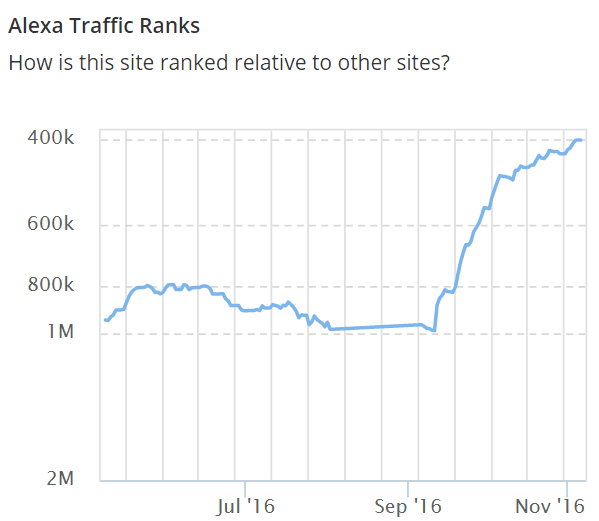
Marketing Tools 101
There are far too many tools out there for us to cover everything, so let’s focus on three main areas that are (perhaps) the most difficult to manage:
- SEO
- Email Marketing
- Content Writing
SEO
This is one of the biggest areas of marketing, and arguably the most important, as its ongoing nature requires huge commitment from marketing teams…particularly as Google regularly changes its algorithms (see here for their latest update on Penguin 4.0). Many of the marketing tools we use in TAMI are inspired by a desire to improve SEO efforts, and here are our top 5 picks:
Screaming Frog
This is a fantastic tool for anyone trying to get their head around the more ‘tech’ side of SEO: alt text, canonical URLs, H1 tags, etc. You simply run your website through the system, and it returns every outstanding issue from an SEO perspective. Everything from missing meta titles to image files being over 100 kb, it’s all there. And what’s better is that the Screaming Frog guys kindly offer a great user guide on their website, including an explanation of each SEO element that the system reports on.
Top 3 appealing features:
- They offer a free edition that will analyse up to 500 URLs per crawl (after that, a licence fee of £149 per year is required to remove the 500 URL restriction)
- The depth of reporting, and website changes being accounted for in real time
- The ease of installation on your computer

Check out Screaming Frog here!
Ahrefs
In terms of SEO tools for keyword research, backlink reports, etc. we’ve tried a few different ones, but Ahrefs came out on top. This comprehensive tool provides great insight into, not only keyword rankings, crawl reports, domain health, and backlink analysis, but also what your competitors are doing and how you measure against them. The main dashboard also provides for a great user experience, with very responsive and easy to use navigation tools. They also offer a free 14-day trial, and four different pricing plans with an opportunity for annual billing to save 20% on cost.
Top 3 appealing features:
- In-depth analysis of competitor activity and SEO efforts
- Keyword explorer tool provides great insight into global search volumes on Google
- Responsive and helpful support team
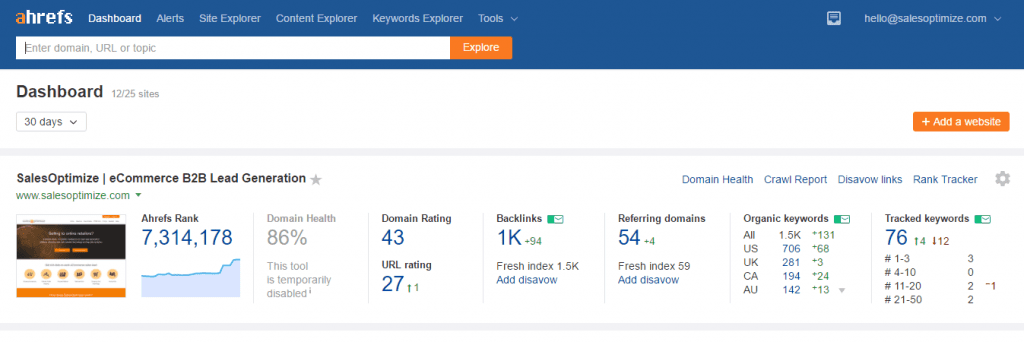
Check out Ahrefs here!
Google Search Console
Search Console, part of Google’s Webmaster Tools, is most certainly a necessity for marketers. If you want to know how well you’re performing on Google, i.e. how you’re ranking for organic keywords and what sort of impressions and clicks your site URL is getting (and let’s face it, who isn’t interested in that??), then you need to start using this. It can be easily synced up with your Google Analytics account, and there’s a quick and easy guide on how to do that here. You can also check out their other features such as crawl errors, backlink reports, the mobile usability of your site, and ways to make HTML improvements.
Top 3 appealing features:
- In-depth analysis of organic keyword rankings with custom date ranges, and easily synchronised with Google Analytics account
- Completely free to use
- Ability to filter by queries, countries, and devices
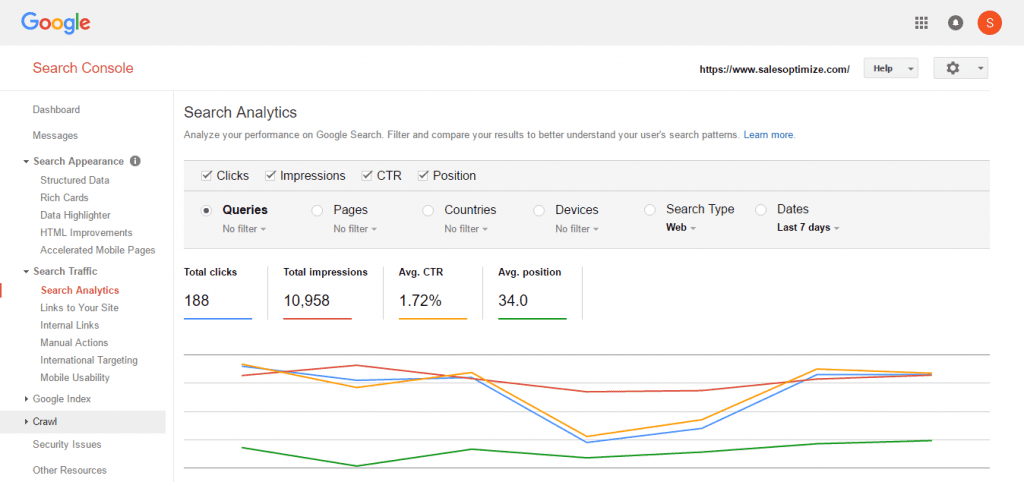
Check out Google Search Console here!
SEO Book: Keyword Density Analyzer
SEO Book is a website that I discovered relatively recently that has a fantastic little tool called ‘Keyword Density Analyzer’ – essentially, you enter in a URL and it provides a breakdown of the keyword density of that page/site, i.e. what terms are appearing most regularly, and whether they feature in the alt text, main body content, meta titles/descriptions, links, or images.
What’s particularly handy about this tool is that you can use it as a measure against competitors on the Google SERP. If you’re trying to rank on page 1 for a certain keyword, input the URLs of the sites that are already appearing on page 1, and take note of the density of that keyword you’re trying to rank for. It will give you a good indication of how prominent the keyword needs to be on the page in question, and where it should be featured. Currently, we are using this tool to help us improve our presence on Google for the terms: ‘lead generation’ and ‘sales leads.’
Top 3 appealing features:
- Good analysis of where your keywords appear in meta titles, descriptions, alt text, links, etc.
- Completely free to use
- Great opportunity to measure against competitors
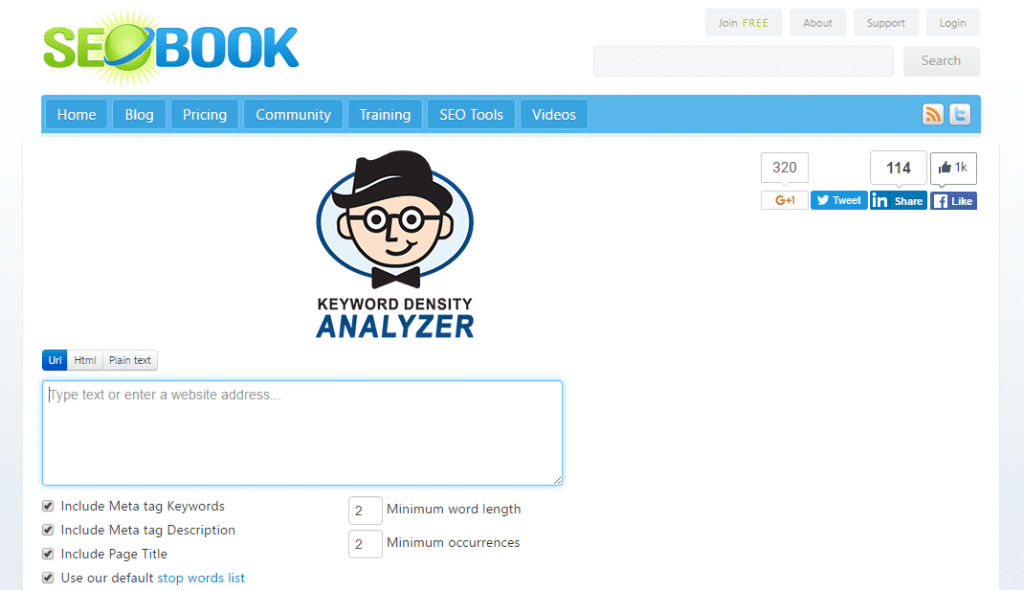
Check out the Keyword Density Analyzer tool here!
HitTail
Long tail keywords (usually 3 or more words in length) are incredibly important in SEO, and due to their highly specific nature, can greatly improve conversions over head keywords. HitTail is a great tool that analyses your website and provides suggestions on good long tail keywords to focus on. Not only this, but it also scores each keyword between 1 and 10, the higher scores increasing your likelihood to appear on page 1 of Google and increase traffic to your website. HitTail constantly works in the background to update keywords, so you’re always getting new suggestions. This is also hugely helpful, considering that we are interacting more and more with semantic searching on Google, i.e. search queries that aim to not only find keywords, but also determine the intent and contextual meaning of the words a person is using for search. HitTail offers a free trial for the first 15 keyword suggestions, and three pricing plans that range from pro to agency.
Top 3 appealing features:
- Great suggestions for improving the presence of long tail keywords on your website
- Good value for money on pricing plans – cheapest starts at $19.95 per month, and provides 7,500 keyword ideas
- They offer custom written articles (400 words) for $19 that are original and SEO optimised
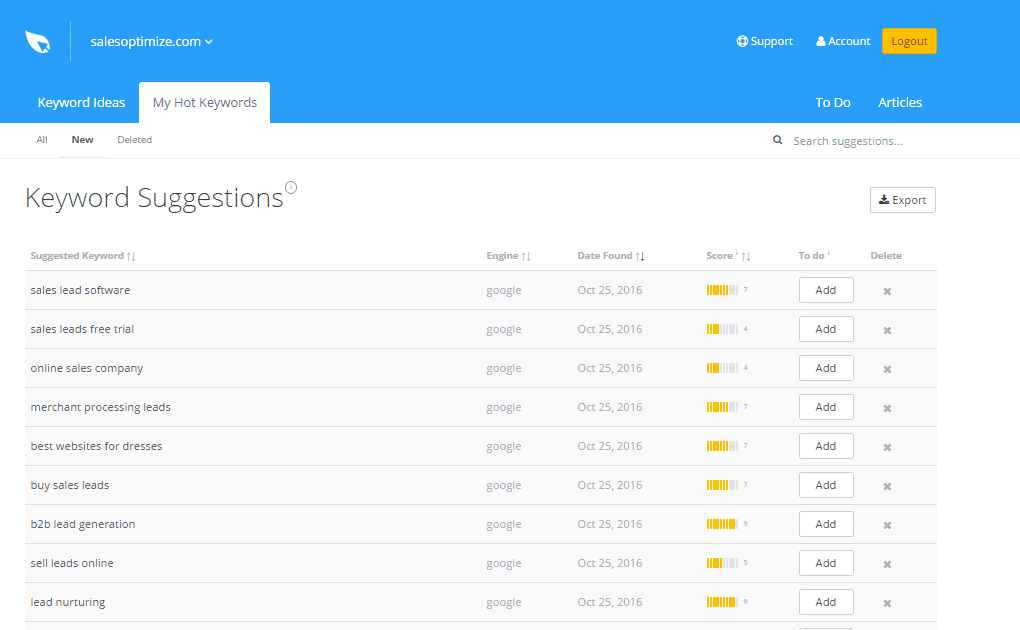
Email Marketing
Usually when it comes to email marketing, companies tend to use the same software for reliability. We have tried two different email marketing platforms, both with uniquely great features. I’m sure you’ve heard of them, but just in case:
Hubspot
Where do I even start? Hubspot is like an all-in-one inbound marketing package that offers blog hosting, CRM, email marketing, landing page creation, and plenty of other great features. We use it exclusively for email marketing and landing page creation. You may need a little bit of knowledge on html and basic design capabilities (and sometimes a bit of patience!), but the Hubspot Academy usually has the answers to your questions.
Hubspot contracts are billed annually, and there are three pricing plans to choose from. They also offer add-ons for reporting and advertising. If budget permits, Hubspot is an excellent tool to have in your arsenal.
Top 3 appealing features:
- Real time reporting data on all email campaigns, with exportable key metrics and stats
- Great landing page editors with designs that are easily customisable
- Good tips and tricks on how to improve your campaigns with the Hubspot Academy
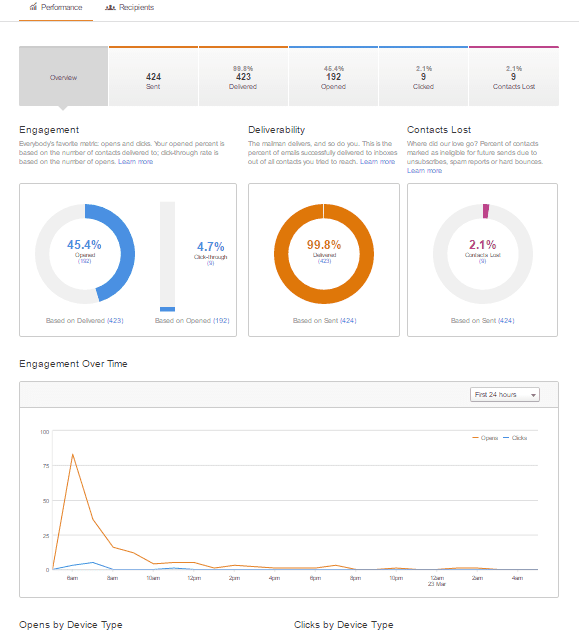
Check out Hubspot here!
MailChimp
MailChimp is one of the most easy-to-use email marketing tools I’ve come across. In contrast to Hubspot’s endless bells and whistles, MailChimp’s primary function is email marketing…but don’t let that deter you, these guys know a thing or two about good emails! They offer A/B testing too, so you can measure the performance of your campaigns and see which one works best.
Despite its simplicity, MailChimp is extremely sophisticated in terms of CSS…i.e. they make your emails look super cool and professional. And it’s completely free to use until you reach 2,000 subscribers and 12,000 emails per month – after that, you need to pay a small fee (which is very reasonable!) They also offer a paid add-on called Mandrill, a transactional email API for sending tailored eCommerce messages and automated emails.
Top 3 appealing features:
- Ease of use in creating and designing email templates
- Great A/B testing features
- Hugely beneficial for start-ups and small companies with limited budgets – software is free up to 2,000 subscribers and 12,000 emails per month
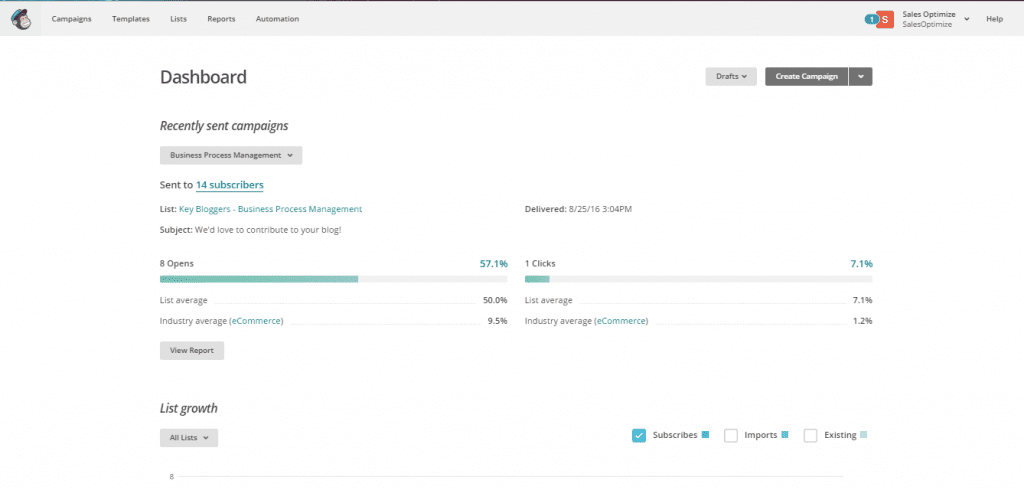
Check out MailChimp here!
Content Writing
Content is king…as they say. And the first thing everyone learns in content marketing university is simply: ‘write good content.’ That said, here are a couple of the tools we’ve come across that have been enormously helpful in providing good ideas and new ways of producing content that is both relevant and interesting:
Answer The Public
This is a fiercely sophisticated tool, the homepage sporting just a simple search bar and a man patiently waiting for you to type in a query. In a nutshell, it looks for questions: the whos, whats, wheres, and whys of the topic you’re searching for, all over the Internet. Say for example you write about ‘eCommerce’ or ‘lead generation’, but you’re not sure exactly what to write about – Just use Answer the Public to find out what people are asking the Internet about eCommerce and lead generation. You will come across some great ideas and in a very visually appealing way. And it’s also free!
Top 3 appealing features:
- Completely free to use
- Ability to filter search queries by country
- Great way to discover potentially unanswered questions about your industry
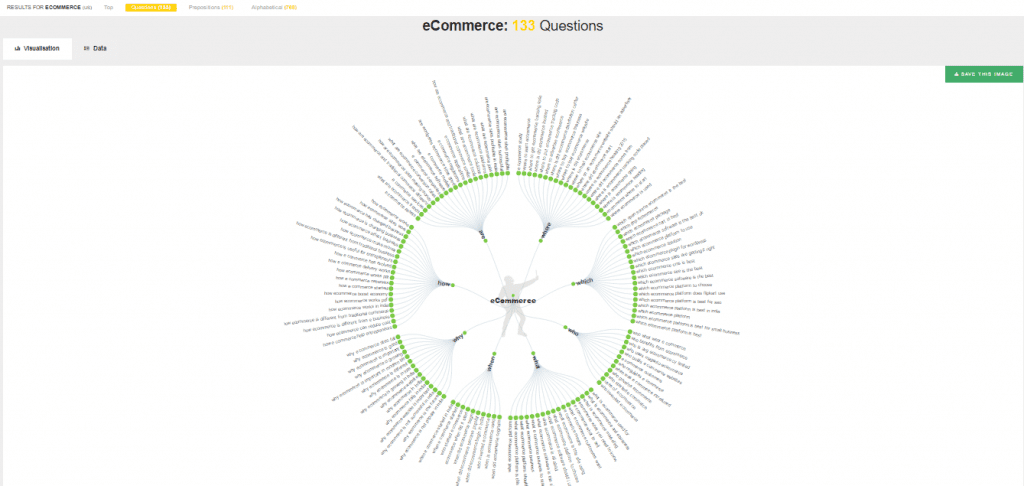
Check out Answer the Public here!
Emotional Marketing Value Headline Analyzer
While physically writing/typing the main body of text may be the hardest part, many people can also struggle with the headline or title of their content. Balancing SEO relevance, as well as appeal in the h1 tag can be difficult to get right, but there’s a nifty tool called the Emotional Marketing Value Headline Analyzer (bit of a mouthful!) that will analyse the emotional marketing value of your title…ok, so it might sound a bit fluffy, but hear me out. It compares your headline against three categories: intellectual, empathetic, and spiritual, and presents you with a score out of 100 – measured against the extent to which the title uses words that are intellectual, empathetic, or spiritual, and how this can resonate with readers. It also provides suggestions for how often these themes should appear in a headline based on the industry you’ve chosen. Although arguably more relevant in a B2C context, business people are humans too – anyone reading your content is likely to experience emotion and feeling…unless of course they’re a robot…which would be kinda cool.
Top 3 appealing features:
- Completely free to use
- Ability to filter search queries by industry
- Great suggestions on how to improve on the use of emotion in headlines and provide a more compelling reason for readers to engage with your content
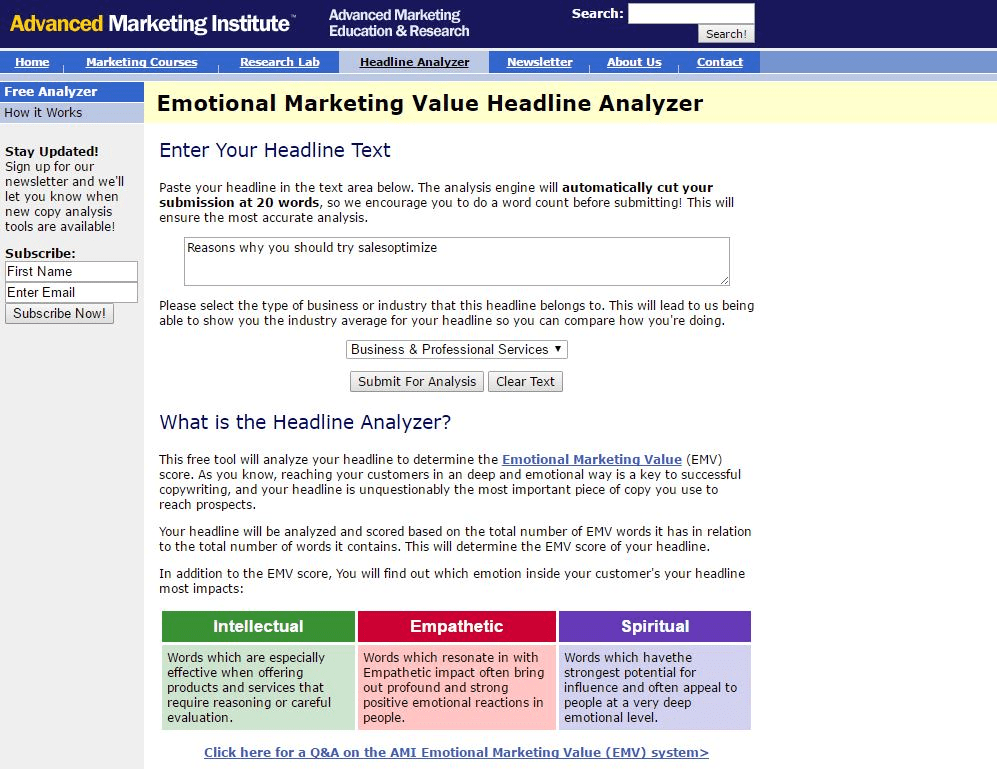
Check out the EMV Headline Analyzer here!
These are just some of the many tools out there that can help companies with their content writing, and two that we have found quite useful. Here’s a great article outlining even more helpful writing tools, whether it’s for productivity, style, and grammar, SEO, or just research and other general ideas. Have a look here!
In Summary…
The growing expectation for marketers to have a more technologically minded approach is alive and kicking, and it’s only a matter of time before this develops even further. Technology is constantly at the forefront of innovation and product development, but with the help of such fantastic tools as the ones mentioned above, marketing professionals can more easily adapt to the ever-increasing digital society that we’re doing business in. They are certainly working wonders for us, and I’m always on the lookout for new ways to become a marketing technology ninja. If you use any tools that aren’t mentioned here but feel they should be mentioned, please let me know and I can add them to the list!









